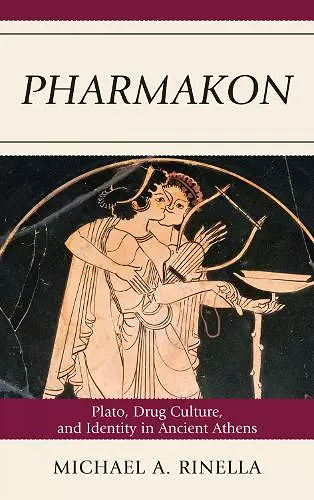Pharmakon
Plato, Drug Culture, and Identity in Ancient Athens
Format:Hardback
Publisher:Lexington Books
Published:5th Jun '10
Currently unavailable, and unfortunately no date known when it will be back
This hardback is available in another edition too:
- Paperback£46.00(9780739146873)

Pharmakon: Plato, Drug Culture, and Identity in Ancient Athens examines the emerging concern for controlling states of psychological ecstasy in the history of western thought, focusing on ancient Greece (c. 750 - 146 BCE), particularly the Classical Period (c. 500 - 336 BCE) and especially the dialogues of the Athenian philosopher Plato (427 - 347 BCE). Employing a diverse array of materials ranging from literature, philosophy, medicine, botany, pharmacology, religion, magic, and law, Pharmakon fundamentally reframes the conceptual context of how we read and interpret Plato's dialogues. Michael A. Rinella demonstrates how the power and truth claims of philosophy, repeatedly likened to a pharmakon, opposes itself to the cultural authority of a host of other occupations in ancient Greek society who derived their powers from, or likened their authority to, some pharmakon. These included Dionysian and Eleusinian religion, physicians and other healers, magicians and other magic workers, poets, sophists, rhetoricians, as well as others. Accessible to the general reader, yet challenging to the specialist, Pharmakon is a comprehensive examination of the place of drugs in ancient thought that will compel the reader to understand Plato in a new way.
Beginning from the most thorough review of classical intoxicants, Rinella applies his findings in detail to many Platonic texts. His results certainly have great significance for students of Plato, but also for the history of medicine and of classical civilization generally. It is a truly impressive accomplishment. -- Anthony Preus, Binghamton University
Rinella’s discussion of the nature and prevalence of drugs in the Classical Age of Athens is an essential context for a major theme in the Platonic dialogues and provides a valuable background for any student of the great philosopher’s works. As Rinella astutely demonstrates, Plato appears to have been the first to address the problem of drug induced ecstasy as dangerous to the well-ordered functioning of society, leading to potentially criminal behavior and non-rational modes of thought, and the philosopher's solution to the problem as the 'noble lie' still survives in our current drug policy. -- Carl A. P. Ruck, Boston University
There is serious scholarship across a range of disciplines, which demands that this be considered a contribution both to history and to studies of society. There is of course a political agenda, an agenda supported with reference to such figures as Derrida and Foucault, but it is muted and mostly kept well in the background. Certain features of Athenian society make this contribution especially welcome. The Greek symposium is currently receiving considerable attention, an institution where wine, itself rich in other intoxicating impurities, was employed to the point of loss of control...He helps us to look at Plato in a fresh new way, even though such perspectives can only capture part of the picture. Few will think that the pleas for a more relaxed attitude to recreational drug use depend on the clarity of his case on every point along his journey. And here too some will feel more relaxed about his conclusions than others. But as with Plato, the text is supposed to be a catalyst to debate, not the final word. * The Social History of Alcohol and Drugs *
[T]his is a vitally important pharmacography. Not only does it shed light on today's 'drugs problem' via the very roots of Western literary and philosophic thought, it does not do the disservice of assumption to the ancient Greeks, and boldy addresses them on their own terms. It is a treasure trove of investigations that, no doubt, will help cast new light on an a multitude of concerns surrounding the human use of that great ambiguity - the drug/pharmakon. * Psychedelic Press UK *
Michael Rinella's Pharmakon: Plato, Drug Culture, and Identity in Ancient Athens . . . .draws upon an impressively diverse array of sources, from literary and historical texts to pottery and other fragments of material culture to recent studies in molecular archaeology. . . .Overall [the book] advances a provocative set of claims [providing] a helpful introduction to the core sources that represent early drug culture. Rinella's treatment of these sources shows how very different discourses were afoot than those so prevalent today. * New Political Science *
ISBN: 9780739146866
Dimensions: 239mm x 164mm x 27mm
Weight: 699g
358 pages